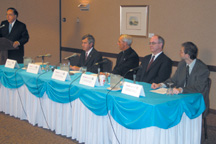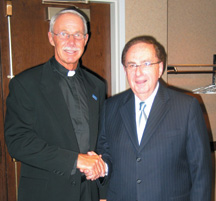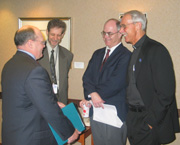 |
UNMC Chancellor Harold M. Maurer, left, addresses the media at a press conference Thursday to announce the creation of the Nebraska Regional Poison Center. Seated, from left, are Nebraska Gov. Mike Johanns; the Rev. John Schlegel, president of Creighton University; James Armitage, M.D., dean of the College of Medicine; and Steve Seifert, M.D., medical director of the new poison center. |
Continuing an ongoing tradition of collaboration, the State of Nebraska has partnered with Creighton University Medical Center, UNMC and Nebraska Health System to create a new poison center in Nebraska – the Nebraska Regional Poison Center.
Nebraska Gov. Mike Johanns announced the partnership at a news conference at UNMC Thursday morning. He was joined by UNMC Chancellor Harold M. Maurer, M.D., NHS Chief Operating Officer Joe Graham, James Armitage, M.D., dean of the UNMC College of Medicine, Creighton University President the Rev. John P. Schlegel, S.J., Fred Salzinger, Creighton associate vice president for health sciences, and Steven Seifert, M.D., a certified medical toxicologist who will serve as medical director of the new poison center. Dr. Seifert is an associate professor in UNMC’s department of pediatrics and a clinical associate professor in the Creighton University department of pediatrics.
The Poison Center at Children’s Hospital has been solely funded and operated by Children’s for the past 46 years. Last month, Children’s announced that rather than answering the calls locally it would continue to fund a service where calls would be outsourced to a large regional poison center starting Sept. 1. Children’s has elected not to pursue this option. Instead, Children’s has agreed to provide the space, equipment and database during the first 10 months of the new center’s operation in order to ensure a seamless transition. The center will remain at Children’s until an appropriate location is identified to move the unit.
Under the new partnership, the state will provide $500,000 in funding to help Creighton, UNMC and NHS administer a program similar to the one previously offered by Children’s with the hope that it will eventually evolve into a service with more broad-based functions.
 |
The Rev. John Schlegel, left, president of Creighton University, shakes hands with UNMC Chancellor Harold M. Maurer, M.D. |
The funding comes from a combination of two sources that have a connection to poison centers – a bioterrorism grant from the Centers for Disease Control and Prevention (CDC) and a hospital preparedness grant from the Health Resources and Services Administration (HRSA). The CDC grant requires preparation for chemical attacks, while the HRSA grant requires collaboration with a poison center. Creighton, UNMC and NHS will attempt to identify additional funding to help manage the program, which has an annual budget of $1.23 million.
The partnership extends the existing strong collaborations among the State, Creighton University Medical Center, UNMC and NHS. Since 1997, the Nebraska Health and Human Services System (HHSS) has consolidated the medical laboratory testing functions of the state health lab with UNMC and NHS. In addition, over the past two years, the state has worked closely with Creighton, UNMC and NHS on a number of initiatives dealing with bioterrorism preparedness.
Gov. Johanns said the partnership is a “win-win for the entire state.”
“The poison center provides a service that is beneficial to all our citizens,” he said. “We are delighted it will remain in the state. Today’s announcement is a terrific example of how our bioterrorism preparedness dollars and our bioterrorism preparedness planning can be used both to meet the state’s broad public health needs and ensure the infrastructure is in place to address an act of terrorism. It adds another component to our already strong bioterrorism initiatives. I’m thrilled that we could identify the funding to help Creighton, UNMC and NHS make this happen.”
“We are glad that we can direct $500,000 of our bioterrorism funding to keep the poison center in Nebraska,” said Richard Raymond, M.D., chief medical officer for HHSS. “Collaborating with Creighton, UNMC and NHS to make this happen just makes good sense and is consistent with our planning for a response to bioterrorism or any other public health emergency.”
The Nebraska Regional Poison Center will handle calls from Nebraska and Wyoming as well as parts of five neighboring states. Based on the experience of The Poison Center at Children’s Hospital, the new center expects to receive more than 35,000 calls per year, with more than 25,000 of these calls concerning human poisoning exposures.
Under the new partnership, the center’s phone number will remain the same – (402) 955-5555 or toll-free (800) 222-1222.
“I’m delighted that a regional poison center will remain in Nebraska,” Dr. Seifert said. “Many poison centers around the country started in children’s hospitals, but over the years, the majority of centers have become state-supported and moved into academic settings. This change is right in line with what has been going on nationally.”
Dr. Maurer said the addition of the Nebraska Regional Poison Center is a “perfect fit” for the Medical Center and Creighton. “From my time in Virginia (prior to coming to UNMC), I saw first-hand what a valuable resource the poison center is for a state. It will provide a multitude of opportunities for our students, faculty and patients and allow us to better serve the state in our mission of providing the best in education, research and patient care.”
“Creighton University Medical Center collaborates with UNMC and NHS on many fronts. Joining together in equal partnership to operate the Nebraska Regional Poison Center in Omaha is one more example of how a public and private institution can work side-by-side to better serve children, families, schools and public health departments in our community, from across the state of Nebraska and in surrounding states,” Fr. Schlegel said. “Creighton physicians, researchers and other health science professionals will lend their time and expertise to help continue a valuable service that Children’s Hospital has provided for nearly half a century.”
Salzinger said, “Creighton is pleased to participate in the Nebraska Regional Poison Center — not just for its value to our community, but also for the educational and service opportunities it will provide for Creighton students.”
Dr. Armitage praised Children’s Hospital for its past administration of the poison center. “Children’s Hospital provided an extraordinary service to the community over the past 46 years and should be acknowledged for that leadership,” he said.
Dr. Armitage added that resident physicians in emergency medicine, internal medicine and pediatrics will do regular rotations in the new poison center.
 |
Glenn Fosdick, left, CEO of Nebraska Health System, shares a lighter moment with, from left, Steve Seifert, M.D., medical director of the new poison center; James Armitage, M.D., dean of the UNMC College of Medicine; and the Rev. John Schlegel, president of Creighton University. |
“Last year Nebraska Health System recorded 296 poison-related visits to our emergency department,” Graham said. “That volume speaks to the need for a poison center in Nebraska where questions get answered, unnecessary ER visits can be avoided and critically poisoned patients can find the best possible care under Dr. Seifert’s direction.”
“Poison Centers save money,” Dr. Seifert said. “For every dollar invested in a poison center, $7 in health care costs are saved. Three out of four poison exposures can be safely managed at home. This saves Nebraskans nearly $5 million in emergency department visits alone each year.
“More importantly, poison centers save lives. The Poison Information Specialists are highly trained, nationally-certified, and know the capabilities and challenges of our region. And a regional center here can provide bedside clinical consultations to our most seriously poisoned patients.”
In addition, Dr. Seifert will continue to use the poison center to conduct research in a variety of areas. He has authored nearly 60 peer-reviewed medical research articles and more than 50 medical book chapters. His research has included pulmonary conditions related to agricultural work, and the human effects of medications used in animal husbandry.
“Regional-specific research is another benefit of having a poison center here,” Dr. Seifert said.
“A poison center is an invaluable resource,” Dr. Raymond said. “The
community education component is outstanding and provides families and schools information on preventing accidental poisoning.”
He said the sophisticated toll-free calling system uses highly trained, nationally certified nurse specialists to respond to questions from the public about poisonous substances and would be used for public education in a public health emergency. HHSS is currently contracted with the poison center to back up and monitor the state’s Health Alert Network (HAN) 24 hours a day, 7 days a week and immediately notifying Dr. Raymond on all alerts.
HHSS also is currently contracted with the poison center to have a redundant system that can send fax or e-mail messages at any time to all health-care providers, local and district health departments, hospitals and community health centers should an act of bioterrorism occur, such as last year’s anthrax scare.